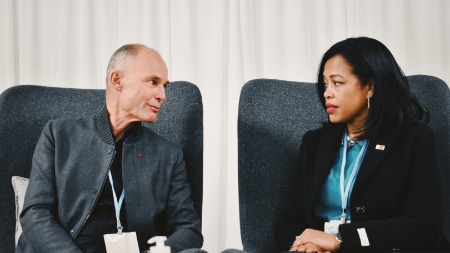Opinion
Climate: a possible win-win at COP26

THE TOPS AND FLOPS OF COP26. The Glasgow conference will be successful only if it can be shown that economic interests converge with those of climate advocates. Ambitious goals could then win everyone over. Bertrand Piccard, president of the Solar Impulse Foundation, psychiatrist and explorer, author of the first round-the-world trip in a balloon (1999) then in a solar plane (2015-2016), will keep during this fortnight a daily chronicle of the successes and disappointments of this meeting, crucial to the future of our planet. An exclusive for La Tribune and the Swiss daily Le Temps.
There is nothing more important than bringing world leaders together around climate issues. There is nothing more frustrating too. The Glasgow conference which opens today offers the ultimate opportunity to define a roadmap that will allow us to emerge from the climate crisis.
As I am used to these international conferences, I also know that we will spend a lot of time arguing on commas, and that major countries will refuse the choices which are however blatantly necessary. Even if the context of natural disasters, mobilisation of young people and the effects of the pandemic have accelerated the awareness of a common future, economics will remain a priority in the decision-making of countries participating.
The first major stake of this COP26 is to reevaluate and up the commitments to fight global warming of the 196 signatory states of the Paris Agreement. This is essential to achieving the set objective, namely a 45% reduction in global greenhouse gas emissions by 2030. The current trajectory is bad, and its reversal requires strong measures as well as significant investments.
The first good news is that this goal remains achievable. The second is that the measures will not only be good for the environment and the quality of life of citizens, but also for the economy. They offer tremendous opportunities for the development of new revenue streams and in building profitable infrastructure to decarbonise the world. This is what negotiators must take into account. If they believe that ambitious commitments will be detrimental to their economic development, they will continue to resist any change.
If the Glasgow negotiators realise that the opposite is true, that environmental protection has become the greatest driving force for the economy, I see a chance for this COP26 to become a success.
Market mechanisms for carbon
The second challenge is to establish market mechanisms for carbon. If a country is struggling to meet its targets on its own, it can take reduction measures (i.e. install solar panels) in another country. The investor State will receive “carbon credits” from this action which it can include in its own balance sheet. The objective of this mechanism is to achieve carbon neutrality as quickly as possible at the global level, because it is often more efficient and less expensive to invest in a developing country where emissions can be greatly reduced, with low investment.
However, this system has several detrimental effects: developed countries may be tempted to achieve part of their objectives abroad, which will cause necessary investments at home to lag behind. The other problem comes from its accounting: normally, the investing country registers the action for its own benefit. But some states want keep the credit for any foreign investment made on their soil ... Thus, to avoid double counting, it is necessary to establish strict rules in the traceability of projects. And this will keep negotiators busy for long nights.
The third stake of this COP26 is to reach the objective of raising 100 billion dollars of investment in poor countries each year through the Green Climate Fund until 2025. For the moment, these amounts have not been reached but, according to organizers, this objective is achievable and it is obviously desirable. These investments also offer tremendous opportunities to implement the 1,300 solutions labeled by the Solar Impulse Foundation.
From Glasgow, I will come back daily on this section, commenting on the successes and disappointments of this COP26 so decisive for the future humanity.
This opinion piece was first published in La Tribune and the Swiss daily Le Temps.



